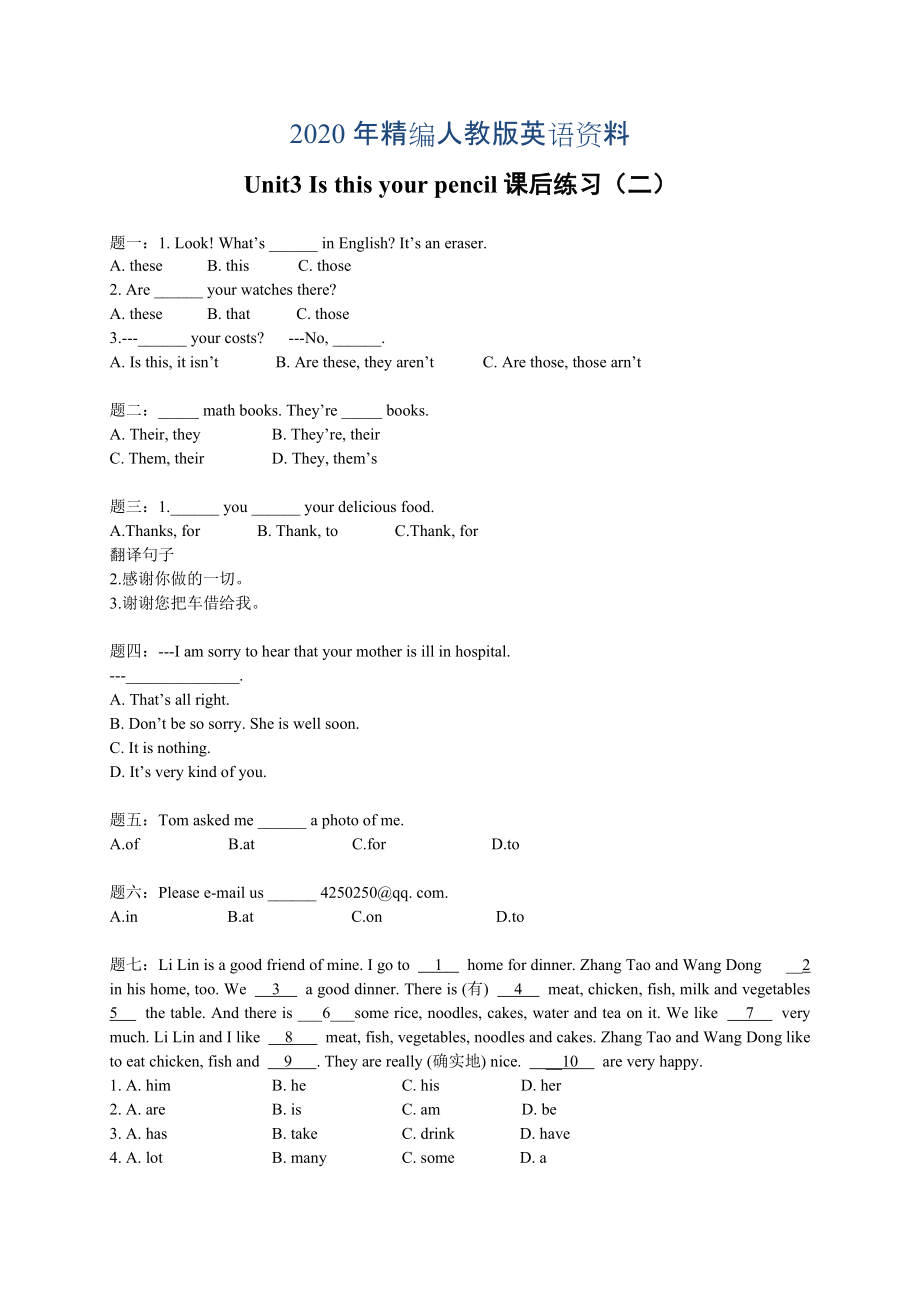《年人教版七年級(jí)上冊(cè) Unit3 Is this your pencil 練習(xí)2【含解析】》由會(huì)員分享����,可在線閱讀��,更多相關(guān)《年人教版七年級(jí)上冊(cè) Unit3 Is this your pencil 練習(xí)2【含解析】(3頁珍藏版)》請(qǐng)?jiān)谘b配圖網(wǎng)上搜索。
1��、2020年精編人教版英語資料
Unit3 Is this your pencil課后練習(xí)(二)
題一:1. Look! What’s ______ in English? It’s an eraser.
A. these B. this C. those
2. Are ______ your watches there?
A. these B. that C. those
3.---______ your costs? ---No, ______.
A. Is this, it isn’t B. Are the
2���、se, they aren’t C. Are those, those arn’t
題二:_____ math books. They’re _____ books.
A. Their, they B. They’re, their
C. Them, their D. They, them’s
題三:1.______ you ______ your delicious food.
A.Thanks, for B. Thank, to C.Thank, for
翻譯句子
2. 感謝你做的一切�����。
3. 謝謝您
3���、把車借給我。
題四:---I am sorry to hear that your mother is ill in hospital.
---______________.
A. That’s all right.
B. Don’t be so sorry. She is well soon.
C. It is nothing.
D. It’s very kind of you.
題五:Tom asked me ______ a photo of me.
A.of B.at C.for D.to
4��、題六:Please e-mail us ______ 4250250@qq. com.
A.in B.at C.on D.to
題七:Li Lin is a good friend of mine. I go to 1 home for dinner. Zhang Tao and Wang Dong __2 in his home, too. We 3 a good dinner. There is (有) 4 meat, chicken, fish, milk and vegetabl
5����、es 5 the table. And there is ___6___some rice, noodles, cakes, water and tea on it. We like 7 very much. Li Lin and I like 8 meat, fish, vegetables, noodles and cakes. Zhang Tao and Wang Dong like to eat chicken, fish and 9 . They are really (確實(shí)地) nice. __10 are very happy.
1.
6、A. him B. he C. his D. her
2. A. are B. is C. am D. be
3. A. has B. take C. drink D. have
4. A. lot B. many C. some D. a
5. A. in B. on C. at D.under
6. A. and B. also C. too D. but
7. A. them B. they C
7���、. their D. theirs
8. A. eat B. have C. has D.to have
9. A. rice B. rices C. a rice D. an rice
10. A. Us B. Our C. We D. I
Unit3 Is this your pencil
課后練習(xí)參考答案
題一:B C B
解析:1.根據(jù)is判定用單數(shù)形式�,故選擇B�。
2. 根
8����、據(jù)there可知排除A�����,又因?yàn)閍re�����,可知選擇C�����。
3. 根據(jù)coats先排除A����,are these/those提問時(shí)�,用they回答,故排除C�����,選擇B���。
題二:B
解析:第一個(gè)是主語��,需要主格�����,排除AC��。選項(xiàng)D缺少謂語動(dòng)詞�,故此題選B。第二個(gè)空填形容詞性物主代詞�,表示“他們的”。
題三:C�; Thank you for everything.;Thank you for lending me your car.
解析:1.thanks為名詞= thank you�����,故排除A��;thank sb. for sth.“因...而感謝某人”�,故選擇C。
2. thank sb. for s
9�����、th.“因...而感謝某人”。
3. thank sb. for sth.“因...而感謝某人”�。lend sb. Sth.“借給某人某物”��。
題四:D
解析:根據(jù)上文�����,“很難過聽說你母親生病住院了”�,下文應(yīng)該對(duì)對(duì)方的關(guān)心表示感謝,選擇D���,“你真好”���;That’s all right“沒關(guān)系”,回答別人的感謝和道歉��;B不符合英語習(xí)慣�;it is nothing“小事”,不合語境����。
題五:C
解析:ask sb. for sth.“向某人索要某物”。
題六:B
解析:email sb. at + 電郵地址���。
題七:C A D C B B A D A C
解析:1.根據(jù)下文in
10���、 his home, too�,可知選擇C���。
2. Zhang Tao and Wang Dong作主語���,be動(dòng)詞用are。
3. have a dinner“吃飯”����,主語為we,用have�����。
4. meat不可數(shù)��,所以排除BD����,a lot of=lots of修飾可數(shù)名詞和不可數(shù)名詞,所以排除A��,選擇some。
5. 在桌子上用on�����。
6. 根據(jù)句意�,空處缺少副詞“也”����,先排除AD;too“也”�,放在句末,逗號(hào)隔開�;also“也”,放在句中����,故選擇B。
7. 空處缺少賓語�����,指代上文食物�����,用賓格形式them。
8. like to do“喜歡做某事”��,故選擇D���。
9. rice“米飯”為不可數(shù)名詞����,故選擇A�����。
10. 空處作主語�����,故先排除AB���,又因?yàn)榭蘸骯re可知排除D��,選C����。
 年人教版七年級(jí)上冊(cè) Unit3 Is this your pencil 練習(xí)2【含解析】
年人教版七年級(jí)上冊(cè) Unit3 Is this your pencil 練習(xí)2【含解析】

